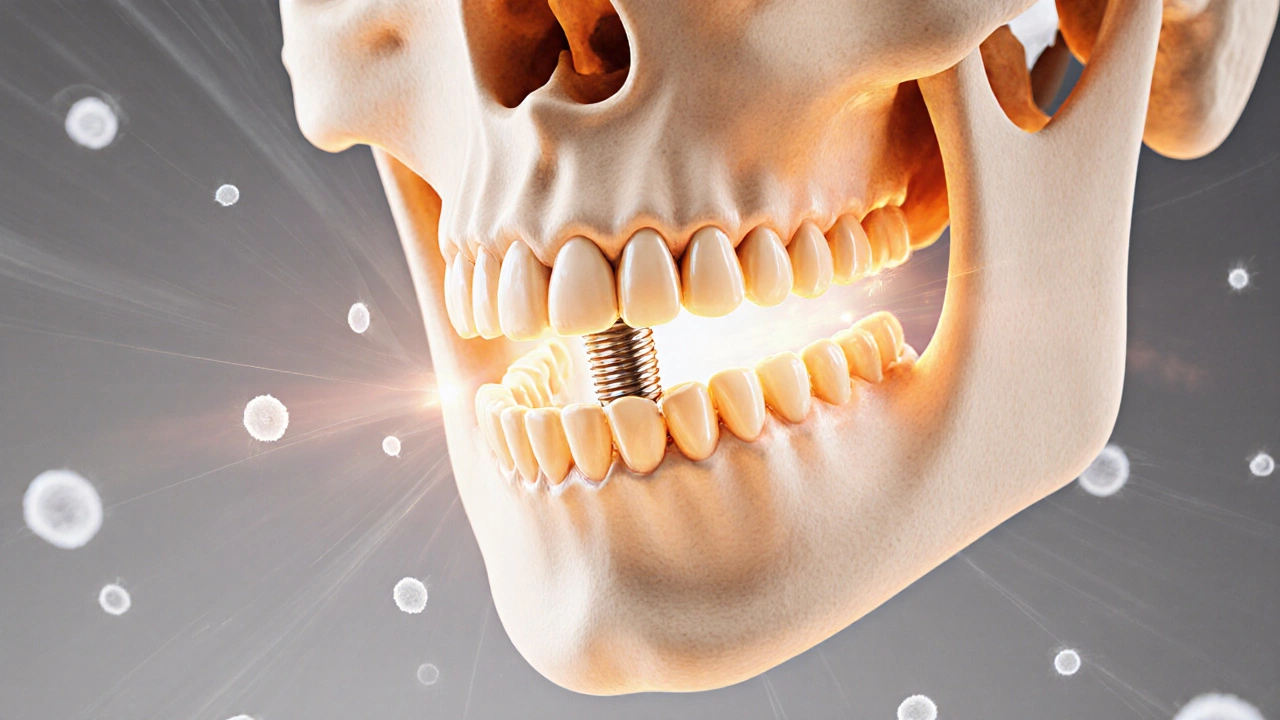Dental Implant Pain Estimator
This tool estimates your expected pain level and recovery time based on factors from real patient experiences. Input your details below to get a personalized assessment.
Most people worry about pain when they hear they need a dental implant. The truth? It’s not nearly as bad as most expect. You won’t be screaming in the chair. You won’t be lying awake for days afterward. Modern dental implant procedures are designed to be as comfortable as possible - and most patients say the biggest discomfort comes from the anxiety before the appointment, not the procedure itself.
What Happens During the Procedure?
A dental implant replaces a missing tooth root with a small titanium post. The dentist drills a tiny hole into your jawbone and screws the post in. Then, after a few months of healing, they attach a crown on top. Sounds scary? It’s not. You’ll be numb. Local anesthesia is standard. If you’re nervous, sedation options like nitrous oxide or oral sedatives are available. The whole process usually takes 30 to 90 minutes per implant, depending on complexity.
There’s no cutting open your cheek or pulling out bone. It’s precise. The drill is small. The incision is tiny. Most patients describe the feeling as pressure - not pain. One patient, a 52-year-old teacher from Ohio, said: "I felt the vibration more than anything. Like a dentist’s drill on a filling, but deeper. But I didn’t feel sharp pain at all."
Pain After the Surgery: What’s Normal?
Right after the numbness wears off - usually 2 to 4 hours later - you’ll feel some soreness. It’s similar to the ache you get after a tooth extraction. Your gums will be tender. The area around the implant site might swell slightly. That’s normal. Most people rate the discomfort between 2 and 4 out of 10 on the pain scale.
You’ll be given pain relievers - usually ibuprofen or acetaminophen. Stronger prescriptions like opioids are rarely needed. In fact, a 2024 study in the Journal of Oral Implantology found that 78% of patients managed their pain with over-the-counter meds alone. Only 12% even used their prescribed painkillers.
Swelling peaks around day two and fades by day four. Ice packs help. Saltwater rinses (after 24 hours) reduce inflammation. Avoid hot foods, straws, and smoking. These can delay healing and increase discomfort.
How Long Does the Pain Last?
Most people feel back to normal within 3 to 5 days. The sharp, throbbing pain is gone by day two. The dull ache? It fades slowly. By day five, you can eat soft foods without discomfort. Some patients say they barely noticed the implant was there after a week.
But here’s what most don’t tell you: the healing process takes months. The implant fuses with your jawbone - a process called osseointegration. During that time, you might feel occasional pressure or mild soreness when chewing, especially if you’re eating something hard. That’s not pain - it’s your body adapting. It’s not a problem unless it gets worse.

When Pain Is a Red Flag
Not all discomfort is normal. If you experience any of these, call your dentist right away:
- Severe, worsening pain after day three
- Pus or foul taste coming from the implant site
- Fever over 100.4°F (38°C)
- Swelling that spreads to your cheek, neck, or eye
- Loose implant or visible metal post
These signs could mean infection or implant failure. They’re rare - less than 3% of cases - but they need immediate attention. Don’t wait. Early treatment fixes 95% of these issues.
Why Some People Say It Hurts More Than Others
Not everyone has the same experience. Why? Several factors play a role:
- Number of implants: One implant? Mild discomfort. Four? More swelling, longer recovery.
- Bone quality: If your jawbone is thin or weak, the dentist might need a bone graft. That adds a second procedure and a few extra days of soreness.
- Smoking: Smokers heal slower. Their risk of infection is 2 to 3 times higher. Pain lasts longer.
- Anxiety: People who stress about pain tend to notice it more. Nervousness can make your muscles tense, which makes recovery feel harder.
- Previous dental trauma: If you’ve had bad experiences with extractions or root canals, your brain expects pain. That expectation can amplify your perception.
One woman in her 60s told me: "I had a root canal years ago that went wrong. I was terrified. But the implant? Easier than the root canal. I didn’t even take the pain pills they gave me."

What You Can Do to Make It Easier
Here’s how to cut your recovery time and reduce discomfort:
- Follow the aftercare instructions - no exceptions. Even skipping one saltwater rinse can delay healing.
- Stick to soft foods for the first week: yogurt, mashed potatoes, scrambled eggs, smoothies.
- Sleep with your head elevated for the first two nights. That cuts swelling.
- Don’t touch the area with your tongue or fingers. You’ll irritate it.
- Use a cold compress on your cheek for 15 minutes at a time, every hour on day one.
- Ask your dentist about a prescription for a numbing mouth rinse if you’re worried about soreness.
One pro tip: Buy a soft-bristled toothbrush before your surgery. You’ll need to clean your other teeth gently, but avoid brushing right next to the implant site for the first 24 hours.
Is It Worth It?
Let’s be honest - no one wants to go through any kind of surgery. But dental implants are the gold standard for replacing missing teeth. Unlike dentures, they don’t slip. Unlike bridges, they don’t require grinding down healthy teeth. They last 20 to 30 years with good care.
People who get implants often say the same thing: "I didn’t realize how much I was holding back - smiling, eating, talking - until I got my implant. Now I feel like myself again."
The pain is temporary. The benefit? Lasts decades.
Is getting a dental implant more painful than a tooth extraction?
For most people, no. Tooth extractions - especially impacted wisdom teeth - often involve more cutting, more swelling, and longer recovery. Dental implants are more controlled. The area is numbed precisely, and the procedure is less invasive. Many patients report less pain after an implant than after a complicated extraction.
Can I get dental implants if I’m scared of needles?
Yes. Dentists have multiple options for patients with needle anxiety. Topical numbing gel can be applied first to reduce the sting. Nitrous oxide (laughing gas) helps you relax during the shot. Oral sedatives taken an hour before the appointment can make you drowsy and less aware. Some clinics even offer needle-free jet injectors for local anesthesia. Talk to your dentist ahead of time - they’ve seen this before and know how to help.
How soon can I eat normally after an implant?
You can start eating soft foods within a few hours after the numbness wears off. Avoid chewing directly on the implant site for the first week. By day 7, most people can eat regular foods, though you should still avoid hard, crunchy, or sticky items like nuts, popcorn, or caramel until your dentist gives the all-clear - usually around 4 to 6 weeks after surgery.
Do dental implants hurt more than braces?
Braces cause ongoing, low-level pressure that lasts months or years. Dental implant pain is short-term and localized. You might feel sore for a few days after the implant, but braces require constant adjustment and can cause mouth sores, loose brackets, and sore teeth every few weeks. The acute pain from an implant is far less than the long-term discomfort of braces.
Will I need time off work after the procedure?
Most people take the rest of the day off and return to work the next day. If your job involves heavy lifting, public speaking, or physical activity, you might want to take two days. But for desk jobs, light duties, or remote work? Many patients go back the same day. Just avoid intense meetings or events if you’re still swollen.
Can I get dental implants if I have diabetes?
Yes - but your blood sugar needs to be well-controlled. High glucose levels slow healing and raise infection risk. Your dentist will likely ask for your last HbA1c test result. If it’s under 7%, you’re usually a good candidate. If it’s higher, they may recommend better control before proceeding. Many diabetic patients get implants successfully - they just need a little more care in aftercare.
Final Thoughts: Pain Is Temporary, Confidence Is Lasting
Dental implants aren’t fun. But they’re not the nightmare people imagine. The pain is mild, brief, and manageable. The reward? A natural-looking, fully functional tooth that lasts longer than most people’s marriages.
If you’ve been avoiding smiling because of a missing tooth, waiting won’t make it easier. It’ll just make you more anxious. Talk to a dentist. Get the facts. Ask about sedation. Ask about pain management. Most clinics offer free consultations. You’ll walk out with a plan - and a lot less fear.
The truth? You’ll forget you ever had the implant. And that’s the best outcome of all.





